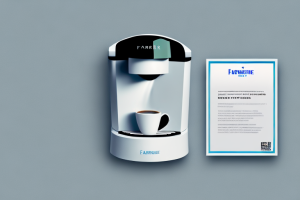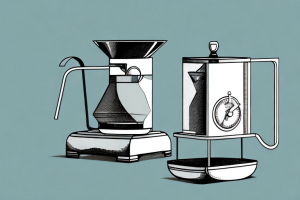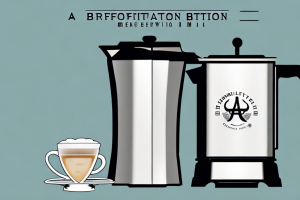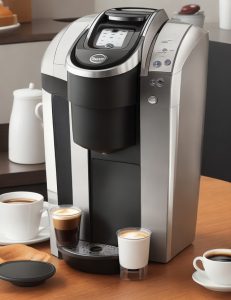How To Clean Commercial Bunn Coffee Maker

A commercial bunn coffee maker being cleaned
As a coffee lover, it is important to maintain the cleanliness of your Bunn coffee maker in order to maintain the quality of your coffee. In this article, we will discuss why it is important to clean your Bunn coffee maker, the tools you will need to clean it, step-by-step guide on how to clean it, as well as some common issues and how to prevent future buildup. Read on to learn more about how to properly clean your commercial Bunn coffee maker.
Why Regular Cleaning of Your Bunn Coffee Maker is Important
One of the main reasons to clean your Bunn coffee maker is to maintain the quality and taste of your coffee. Over time, mineral deposits can accumulate in the machine causing the coffee to taste bitter. Furthermore, a dirty coffee maker can harbor bacteria and other harmful microorganisms that can negatively affect your health.
Another reason to regularly clean your Bunn coffee maker is to extend the lifespan of the machine. When mineral deposits build up, it can cause the machine to work harder and eventually break down. By cleaning the machine regularly, you can prevent this from happening and save money in the long run by avoiding costly repairs or having to replace the machine altogether.
The Tools You Will Need to Clean Your Bunn Coffee Maker
In order to properly clean your Bunn coffee maker, you will need several tools including white vinegar, a clean cloth, a soft-bristled brush, and a coffee filter. It is important to only use soft-bristled brushes to avoid damaging the machine.
Another important tool you will need is a container to hold the cleaning solution. This can be a large measuring cup or a pitcher. It is important to use a container that is large enough to hold the amount of cleaning solution needed to clean your Bunn coffee maker.
Additionally, you may want to consider using a descaling solution to remove any mineral buildup in your coffee maker. This can be especially important if you have hard water in your area. You can find descaling solutions at most home goods stores or online.
Step-By-Step Guide to Cleaning Your Bunn Coffee Maker
To clean your Bunn coffee maker, follow these simple steps:
- Unplug the coffee maker.
- Remove the filter basket and carafe and clean them with warm soapy water.
- Create a vinegar solution by mixing equal parts water and white vinegar.
- Pour the solution into the water tank and turn on the coffee maker.
- Let the solution run through the coffee maker for about 15 minutes.
- Rinse the machine with clean water and run a cycle without coffee to flush out any remaining vinegar.
How to Take Apart Your Bunn Coffee Maker for Thorough Cleaning
To thoroughly clean your Bunn coffee maker, you may need to disassemble certain parts such as the sprayhead and water tank. Refer to the manufacturer’s instructions or user manual for specific details on how to do this.
Before disassembling your Bunn coffee maker, make sure to unplug it and let it cool down completely. This will prevent any accidents or injuries while cleaning.
Once you have disassembled the necessary parts, use a mixture of water and vinegar to clean the inside of the coffee maker. You can also use a soft-bristled brush to scrub away any stubborn stains or buildup.
Tips for Cleaning the Filter Basket and Carafe
To clean the filter basket and carafe, first remove any remaining coffee grounds. Then, wash them with warm soapy water and rinse them thoroughly. It’s important to clean these parts after each use to prevent any coffee residue from building up and affecting the taste of your coffee.
Additionally, it’s recommended to deep clean the filter basket and carafe once a month. To do this, mix equal parts water and white vinegar and pour the mixture into the water reservoir. Run a brew cycle without any coffee grounds, and then repeat the process with plain water to rinse out any remaining vinegar. This will help remove any buildup and keep your coffee tasting fresh.
How to Clean the Sprayhead and Water Tank of your Bunn Coffee Maker
To clean the sprayhead and water tank, first remove any loose coffee grounds or debris. Then, use a soft-bristled brush to gently scrub the parts with warm soapy water. Rinse thoroughly and let them air dry completely before reassembling.
It is important to clean the sprayhead and water tank of your Bunn coffee maker regularly to ensure that your coffee tastes fresh and delicious every time. If you notice any buildup or discoloration on these parts, it may be time for a deep clean.
For a deep clean, you can use a mixture of white vinegar and water to soak the sprayhead and water tank for a few hours. This will help to break down any stubborn buildup and leave your coffee maker looking and functioning like new.
Why Descaling Your Bunn Coffee Maker is Necessary and How to Do It
Descaling your Bunn coffee maker is necessary to remove mineral buildup that can affect the performance and taste of your coffee maker. To do this, fill the water tank with a descaling solution following the manufacturer’s instructions. Turn on the coffee maker and run a cycle without coffee. Rinse the machine with clean water and run another cycle to flush out any remaining solution.
It is recommended to descale your Bunn coffee maker every three months to ensure optimal performance and longevity of the machine. Neglecting to descale can lead to clogs in the water lines and heating elements, which can cause the machine to malfunction or stop working altogether. Regular descaling also helps to maintain the quality and taste of your coffee, as mineral buildup can affect the flavor and aroma of your brew.
Best Practices for Preventing Future Buildup in Your Bunn Coffee Maker
To prevent future buildup in your Bunn coffee maker, use filtered water to make your coffee. This will reduce the amount of mineral deposits that can accumulate in the machine. Additionally, regularly cleaning the machine and using a descaling solution as recommended by the manufacturer can also help prevent mineral buildup.
Another way to prevent buildup in your Bunn coffee maker is to avoid leaving coffee in the carafe for extended periods of time. When coffee sits in the carafe for too long, it can create a buildup of oils and other substances that can clog the machine. It’s best to brew only the amount of coffee you plan to drink and to clean the carafe thoroughly after each use.
Troubleshooting Common Issues When Cleaning Your Bunn Coffee Maker
If you encounter any issues when cleaning your Bunn coffee maker, refer to the manufacturer’s instructions or user manual for specific troubleshooting tips. Additionally, you may want to contact customer support or a professional technician if you encounter any major issues.
One common issue that people encounter when cleaning their Bunn coffee maker is a clogged sprayhead. This can cause the coffee to taste weak or not brew properly. To fix this issue, remove the sprayhead and soak it in a solution of vinegar and water for 15-20 minutes. Then, rinse it thoroughly and reattach it to the coffee maker.
Another issue that may arise is a leaky carafe. This can be caused by a damaged or worn out seal on the carafe lid. To fix this issue, replace the seal or purchase a new carafe. It is important to use only Bunn-approved replacement parts to ensure the proper functioning of your coffee maker.
How Often Should You Clean Your Commercial Bunn Coffee Maker?
It is recommended to clean your Bunn coffee maker at least once a month. However, if you use it frequently, you may need to clean it more often to prevent mineral buildup and ensure the quality of your coffee.
Mineral buildup can occur when hard water is used in the coffee maker. This can affect the taste of your coffee and even cause damage to the machine. To prevent mineral buildup, you can use a descaling solution specifically designed for coffee makers. This should be done every three to six months, depending on the frequency of use and the hardness of your water.
In addition to regular cleaning, it is important to replace the coffee maker’s filters on a regular basis. The frequency of filter replacement will depend on the type of filter used and the volume of coffee brewed. A clogged or dirty filter can affect the taste of your coffee and even cause the machine to malfunction. It is recommended to replace the filters every three months or after brewing 60 pots of coffee, whichever comes first.
Alternative Methods for Cleaning Your Commercial Bunn Coffee Maker
There are several alternative methods for cleaning your Bunn coffee maker including using a commercial descaling solution or using baking soda and water. However, it is important to always refer to the manufacturer’s instructions or user manual for specific recommendations and instructions.
By following these tips and guidelines, you can effectively clean your Bunn coffee maker and maintain the quality of your coffee. Remember to always refer to the manufacturer’s instructions or user manual for specific details and recommendations on how to properly clean and maintain your coffee maker.
Another alternative method for cleaning your Bunn coffee maker is to use white vinegar. Simply mix equal parts of white vinegar and water and pour the solution into the water reservoir. Run a brew cycle and let the solution sit in the carafe for about 15 minutes before rinsing thoroughly with water. This method can effectively remove mineral buildup and improve the taste of your coffee.



